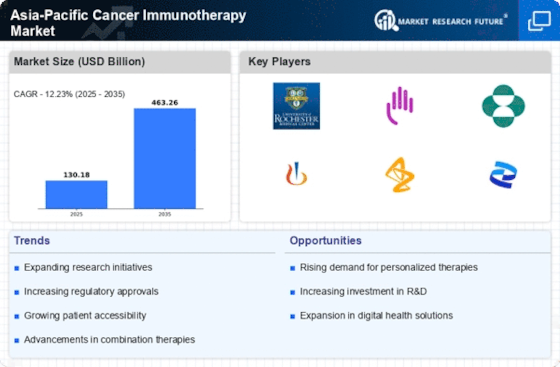Market Share
Asia Pacific Cancer Immunotherapy Market Share Analysis
Because each country in the Asia-Pacific area (APAC) has its own healthcare system, legislation, and goals, cancer may be treated in several ways. You must understand these differences to create successful market share distribution plans.
Patients in APAC nations may have different cancers and DNA variants. Immunotherapy therapies targeted to local cancers are successful and useful. Additionally, it helps enterprises enter many regional markets.
When addressing health care in Asia-Pacific, cultural variations might be substantial. Be specific and succinct. If communication tactics respect people's values and fit the local culture, they're more likely to accept cancer immunotherapy. Field testing in many Asia-Pacific countries helps people learn more about the product and get official approval faster. Clinical studies that examine genetic differences and treatment responses in a market help new enterprises access that market. Because these studies give market-specific data.
Building trust and managing complicated healthcare systems requires strong relationships with local healthcare providers. When doctors, hospitals, research institutes, and immunotherapy companies work together on long-term goals, adding cancer immunotherapy to the normal treatment regimen is easier.
It might be difficult to traverse APAC's many legal sites. To successfully enter a market, you must follow rules and receive permissions quickly. Every country has its own restrictions, therefore corporations must modify their strategy. Managing the unique economies of APAC countries is crucial. Cancer immunotherapy is easier when rates and payment alternatives are transparent, health care costs are considered, and income levels are considered. This improves the market.
Healthcare workers in Asia-Pacific countries that engage in education and training programs will find the product easy to use. When doctors understand cancer immunotherapy's aim and uses, it's easier to explore it alongside other treatments. By providing patient care, Asia-Pacific cancer patients' requirements are met in every way. Access to therapeutic treatments, instructional resources, and financial support improves the experience, which boosts trust in the organization and improves the business's image.
Since APAC people are tech-savvy, technology is vital to monitor treatments and improve medical services. Digital health technologies like telemedicine and online monitoring may enhance cancer immunotherapy and patient outcomes. Due to APAC's vastness, a strong supply chain is crucial. Establishing strong transportation networks and guaranteeing timely commodity delivery makes the market more competitive.
Since the APAC market is continually changing, industry specialists are monitoring it thereafter. Modifying your products based on real-world data, evaluating treatment effectiveness, and addressing new concerns may help you maintain market share as healthcare needs change.


















Leave a Comment